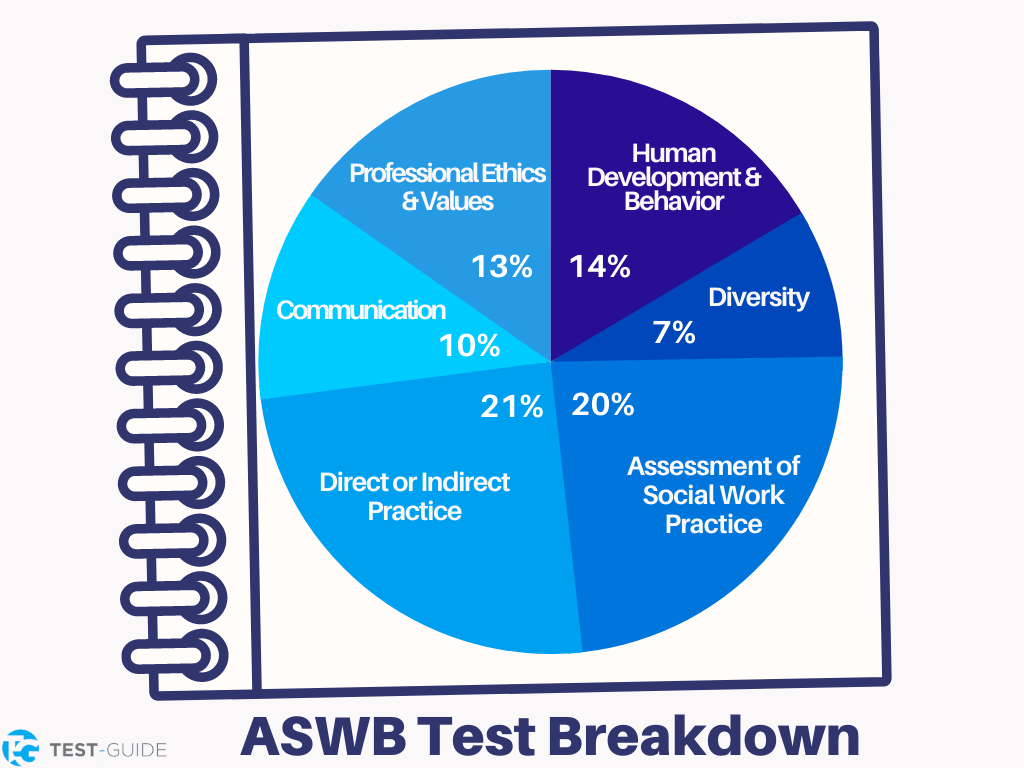
Most social caseworkers are not trained psychiatrists. What should they do when they encounter someone with psychiatric problems?
When someone is repeatedly told that “everything will be alright,” you can expect the person to react in the following way:
Listed below are all of our ASWB practice tests. Take each exam and review the answer explanations to learn key concepts.
As mentioned earlier, there are four levels of ASWB exams. Each level of exam consists of 170 questions but only 150 of the questions are scored. 20 are pretest questions. There’s no way to differentiate the pretest questions from real ones.
Each level will have a slightly different layout so let’s use the Bachelor’s ASWB Exam as an example.

This section will include questions related to theoretical understanding of human behavior in relation to social environments. This includes families, individuals, and communities. Candidates are expected to understand are the behavioral impact of things like addiction and abuse.
A candidate’s knowledge and understanding of diversity and its behavioral impact are tested in this section.
These questions will test a candidate’s understanding of items like social history and collateral data. Social work utilizes data to determine the effects of specific environments on human behavior so candidates need to have a firm understanding of analytics and how it applies to social work.
Social practices are built around relationships with clients so this knowledge is tested in this section of the test. Questions will relate to models of practice, intervention processes, and the collaborative use of relationships in social work.
Candidates are expected to have a high level of knowledge with communication in a social work environment. Questions will include communication principles and techniques.
Social workers must possess a deep understanding of professional ethics and the values expected from their profession. This includes responsibility to clients, as well as the law around confidentiality.
Here are some of the other types of questions that will be asked:
Before a candidate is allowed to register for this exam, they require approval from the social work regulatory board. This approval process starts by submitting an application. The board will then review that application to ensure that the candidate is eligible.
Keep in mind that the exact process will be different for every jurisdiction.
Once the application is approved, a candidate can then register with the ASWB by providing the right materials as required. Then when the second application is approved, the candidate can finally register for the ASWB exam.
Every state has its own board so the legislation will be different. Candidates will want to ensure that they get approval in the area where they plan to live so that their license is within the correct jurisdiction.
So once candidates get all of those initial steps out of the way, they can finally register for the ASWB exam. A fee is required at the time of registration. It’s important to note that this fee is nonrefundable.
Candidates can go to the official site and begin the process of getting their license.
Candidates will either pass or fail this exam. It’s a static scoring system. The exam consists of 150 administered questions and answering between 93 and 107 correct will generally constitute a passing grade. You are not penalized for incorrect answers so be sure to answer them all.
Candidates are given an unofficial score upon completion of the exam but the official certified score will take a couple of weeks. The ASWB exam can be retaken after 90 days if a candidate happens to fail, but it requires the candidate to pay the fee again.
Candidates are required to present two forms of identification before being allowed into the testing facility. You can find additional information about the exam and types of ID by reviewing this candidate handbook.
All personal items must be stored in a secure spot at the testing facility while taking the exam. You’re not allowed to bring anything, including food or drink.
There are some exceptions for individuals with disabilities but candidates must provide documentation from a healthcare provider during the application process.
Within the testing facility, the exam is taken on a computer. The time allowed for the exam is four hours. Candidates are allowed to take breaks, but the time will continue to run during breaks.